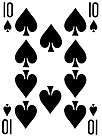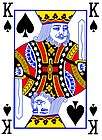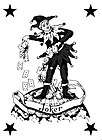jolly
See also: Jolly
English
Etymology
From Middle English joli, jolif (“merry, cheerful”), from Old French joli, jolif (“merry, joyful”)[1] It is uncertain whether the Old French word is from Old Norse jól ("a midwinter feast, Yule", hence "fest-ive") [2], in which case, equivalent to yule + -ive; or ultimately from Latin gaudeō (see etymology at joy). For the loss of final -f compare tardy, hasty, hussy, etc.
Pronunciation
- (Received Pronunciation) IPA(key): /ˈdʒɒli/
- (General American) IPA(key): /ˈdʒɑli/
- Rhymes: -ɒli
- Hyphenation: jol‧ly
Adjective
Derived terms
Translations
jovial — see jovial
Noun
jolly (plural jollies)
Adverb
Derived terms
Verb
jolly (third-person singular simple present jollies, present participle jollying, simple past and past participle jollied)
Derived terms
Italian
Pronunciation
- IPA(key): /ˈdʒɔlli/
This article is issued from
Wiktionary.
The text is licensed under Creative
Commons - Attribution - Sharealike.
Additional terms may apply for the media files.






